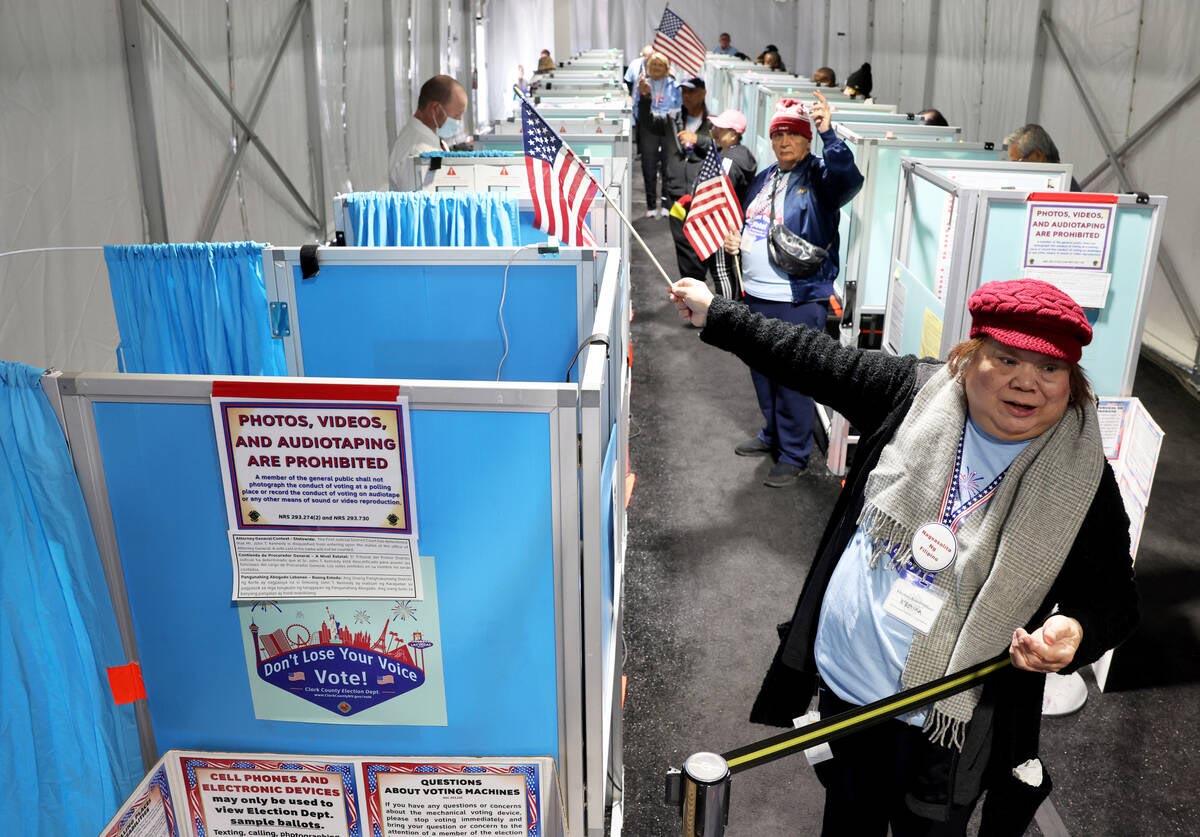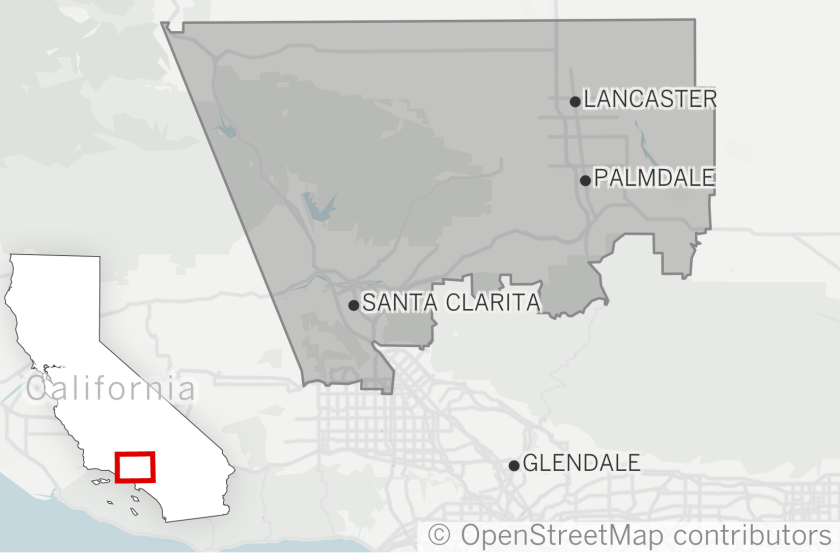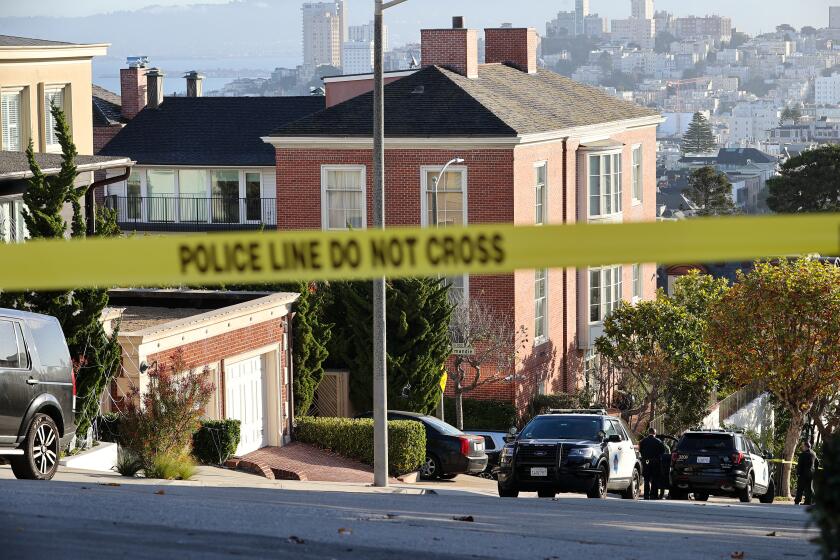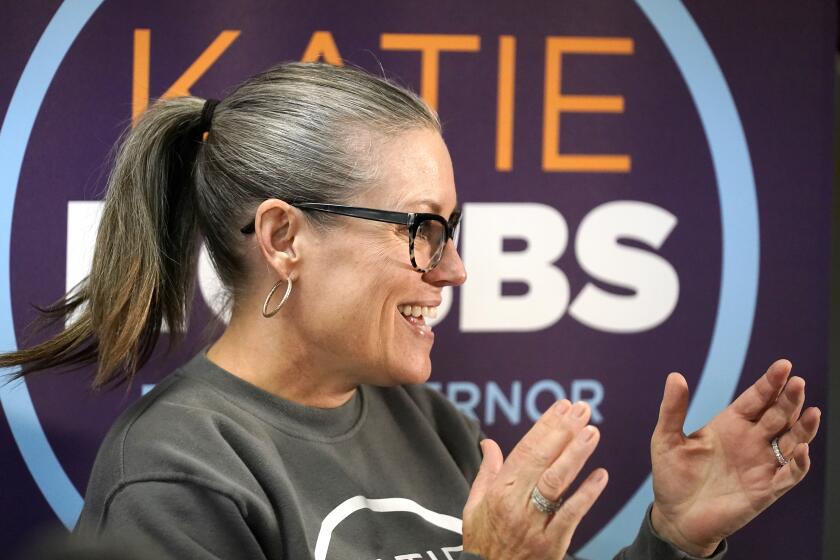Some Democrats are growing glum, but will the 2022 midterm election bring a November surprise?

- Share via
In one sense, the fundamentals of this election season have remained remarkably consistent. President Biden’s approval ratings languish in the low 40s. High inflation stubbornly persists. And odds have stayed stacked against the sitting president’s party.
In another sense, nothing about this moment feels predictable. The cycle has been bookended by two acts of political violence — the Jan. 6, 2021, siege of the U.S. Capitol and the assault on House Speaker Nancy Pelosi’s husband — that underscore the country’s jittery mood. The Supreme Court reversed nationwide protections for abortion rights that had remained in place for nearly 50 years. A former president is facing an unprecedented array of legal troubles, even as he hints at plans to make another White House bid.
The tension between these dynamics has played out like a tug-of-war, with each side seeming at various times to have more pull. But with election day approaching Tuesday, the laws of political gravity appear to have the upper hand over the volatility of a nation on edge. Republicans are favored to flip at least one chamber in Congress, and most Democrats have become increasingly glum about their party’s prospects.
“Historical trends are difficult to break, and the fundamentals in this election remain in place: When the economy is struggling, the party [that holds the White House] suffers,” said Nathan Gonzales, editor and publisher of Inside Elections, a nonpartisan campaign analysis newsletter.

In a deeply divided nation, the one thing unifying Americans is a shared sense of unease. Vast majorities feel the country is heading in the wrong direction, but fewer agree on why that is -- and which political party is to blame. This occasional series examines the complicated reasons behind voters’ decisions in this momentous and unpredictable midterm election.
Still, an air of suspense remains. The GOP advantage has been uneven across 435 House races, 34 Senate contests, 36 gubernatorial elections and scores of other state and local campaigns, according to recent polling and early-voting data. That gives some Democrats a glimmer of optimism that they may stave off their worst-case losses in the House and keep their narrow edge in the Senate. And while the abortion issue has receded from the forefront of many people’s minds, experts say even a small number of additional voters galvanized by the Supreme Court’s reversal of Roe vs. Wade may be enough to affect tight races.
“If you’re in a close race in Georgia, or you’re in a close race in Ohio, and you see an increase of 2% or 3% of new female voters, you can bet those new female voters are being motivated by that decision. And that’s hard for a pollster to identify,” said John Hudak, a senior fellow of governance studies at the Brookings Institution, a Washington think tank.
After the Dobbs vs. Jackson Women’s Health Organization ruling was handed down in June, Democrats saw tangible evidence of a boost, over-performing in five subsequent special elections and decisively defeating an antiabortion referendum in Kansas.
The party hoped the backlash would remain strong enough in November to mobilize those who powered its success in 2018: younger people who leaned Democratic but voted inconsistently.
These “surge Democrats,” as pollster Celinda Lake calls them, would be necessary for her party to exceed expectations.
“A record number of young Democratic women registered to vote,” Lake said. “But are they going to turn out to vote?”
“We need to win women by more than we lose men,” she added. “That’s the key.”
Republicans view abortion as a fading factor, and a slew of polls back them up, with inflation emerging as the runaway top issue on voters’ minds. Between the economic troubles and Biden’s lackluster numbers, they bet this year will fall into the pattern of past midterms — a referendum on the occupant of the White House, whose party has lost ground in all but two contests after World War II.
In the November midterm election, California is one of the battlefields as Democrats and Republicans fight over control of Congress.
“At whose feet would you lay this other than the president?” said Scott Jennings, a Republican strategist. “This election has been about him more than anything. ... If your party is fully in charge of the government, you are going to get credit or blame for what is happening.”
Biden has urged voters to put another issue at the top of mind: the health of American democracy. He has given two prime-time speeches on threats posed by Republicans who deny the outcome of the 2020 election and have cast doubt on their willingness to accept the results of their races if they lose this week.
“I know there’s a lot at stake in these midterm elections, from our economy, to the safety of our streets, to our personal freedoms, to the future of healthcare and Social Security, Medicare. It’s all important. ... But there’s something else at stake: democracy itself,” he said in an address on Friday.
Friday’s attack on Democratic Speaker Nancy Pelosi’s husband, Paul, is the most recent example of the country’s increasing political violence.
Even before the results are in, there is Monday morning quarterbacking about Democrats focusing on a variety of issues, unlike the GOP’s relentless emphasis on the economy and crime.
“The attempt by Democrats to make [the election] about something else — that’s a very, very complex thing to try to pull off,” said David Winston, a Republican pollster who advises House and Senate GOP leadership. He likened Democrats’ message to voters as, “No, your No. 1 issue really isn’t the No. 1 issue.”
An ominous sign for Democrats, Winston said, is the stark swing away from them by independent voters. A crucial component of Biden’s winning 2020 coalition, many of them now have sour views of his handling of the economy. A substantial number — 40% — have an unfavorable view of both parties, Winston said, and may tune out the increasingly negative messaging of the campaign.
“If both sides are attacking each other and [independents] are not getting any new information, they may decide, ‘I’m just unhappy with Biden.’ That’s the one conclusion they’ve managed to get to,” he said.
The limits of Democrats’ abortion-centric strategy have emerged in blue states, where the party has suddenly found itself on the defensive in areas that Biden handily won in 2020.
“There’s been a real bifurcation of the House landscape between red and purple states vs. blue states,” said David Wasserman, who analyzes House races for the nonpartisan Cook Political Report with Amy Walter. “In blue states, where Democrats control both state and federal government, they’re being blamed doubly for high crime and inflation. In purple and red states, Democrats have been more successful in making it more of a choice election since Republicans pushed for abortion bans.”
The emergence of California as a weak spot for Democrats marks a stunning reversal of expectations since the beginning of this year. After the latest round of redistricting, GOP Reps. Mike Garcia of Santa Clarita, David Valadao of Hanford and Michelle Steel of Seal Beach, all of whom won narrowly in 2020, were drawn into less friendly districts. Democrats, who anticipated playing defense for scores of incumbents elsewhere, relished the opportunity to go on the offensive.
California GOP Rep. Michelle Steel faces backlash from Asian American groups over ads depicting Democrat and Navy reservist Jay Chen as a communist sympathizer.
Instead, Democratic Party committees and outside groups have largely stayed off the airwaves in the pricey Los Angeles market, which covers the entirety of five competitive districts, and have opted to use those resources to shore up incumbents elsewhere.
Southern California GOP candidates such as Garcia and Steel have had an advantage in advertising, thanks to aid from super PACs, although some Democrats, most notably Rep. Katie Porter, have amassed enough campaign funds to have a substantial spending edge.
Porter has money and fame, but Republican Scott Baugh is betting on Orange County’s traditional conservatism to flip her House seat.
The Orange County race between Porter, a rising Democratic star, and former GOP state lawmaker Scott Baugh was recently rated a “toss-up” by the Cook Political Report, as are four other races in the state. Six additional California districts are considered competitive.
Early vote returns in California have lagged — just 19% of the state’s nearly 22 million registered voters had turned in their ballots as of Saturday, according to election data reviewed by the Democratic consulting firm Political Data Intelligence. That’s particularly troubling for Democrats, who have tended to outpace GOP voters in early balloting in recent elections. At this point in last year’s vote on whether to recall Gov. Gavin Newsom, 35% of ballots had been cast; the Democrat ultimately won handily.
Some in the party blame the lack of exciting statewide campaigns. With both Newsom and Sen. Alex Padilla expected to easily win reelection, Democrats fear that there’s not enough to coax their voters to the polls.
The lackluster showing in California contrasts with robust turnout in battleground states such as Georgia and Michigan, which shows that the election isn’t following uniform trends nationwide. Party strategist Simon Rosenberg said that was evidence that Democratic campaign efforts could make the difference in key races.
“Democrats are over-performing in the places we’re spending money,” said Rosenberg, who has emerged as a vocal optimist that his party could defy the conventional wisdom on the midterms. “The money we’ve spent in battleground states has created a different election.”
More than 39 million early votes had been cast nationally as of Saturday afternoon, portending a high overall turnout. Since Democrats have been more likely to vote early than Republicans in recent cycles, Rosenberg said, the numbers are “a repudiation of the notion that the energy, intensity, is only going the Republicans’ way.”
Michael McDonald, a University of Florida professor who tracks the early vote, said Democrats would benefit from racking up votes in advance of election day, when Republicans are expected to come out in high numbers. In Pennsylvania, for example, Democrats have a lopsided advantage in the mail ballots that have already been returned, which could help the party’s Senate candidate, John Fetterman, tailor his campaign in the final days.
Trump-backed Mehmet Oz faces daily trolling on social media; now his campaign is mocking Democrat John Fetterman over his stroke, as key Senate race heats up.
“It is to the Fetterman campaign’s advantage to have those votes banked so they can do voter mobilization for people who haven’t voted yet,” McDonald said.
But, he cautioned, it’s difficult to infer from the early-voting data what the outcome will be. As an example, he cited Arizona’s 2020 presidential race, when Democrats had a sizable early-voting lead, but a flood of GOP votes on election day ultimately left Biden with the barest of margins over President Trump.
Gabriel R. Sanchez, a governance studies fellow at the Brookings Institution, said that conclusions about early-voting data are even more difficult to parse because voting patterns have changed so dramatically in recent years.
“It used to be the case that you’d expect Republicans to vote in higher rates early, primarily through absentee,” he said. “But now it’s 180 degrees in the other direction” — a flip that occurred after Trump disparaged voting early or by mail.
High Democratic turnout in the early vote, however, may be offset by a sluggish showing on Tuesday, Sanchez said, adding, “How we calculate elections [has] just become much more difficult.”
Get our L.A. Times Politics newsletter
The latest news, analysis and insights from our politics team.
You may occasionally receive promotional content from the Los Angeles Times.
More to Read
Get the L.A. Times Politics newsletter
Deeply reported insights into legislation, politics and policy from Sacramento, Washington and beyond. In your inbox twice per week.
You may occasionally receive promotional content from the Los Angeles Times.

















